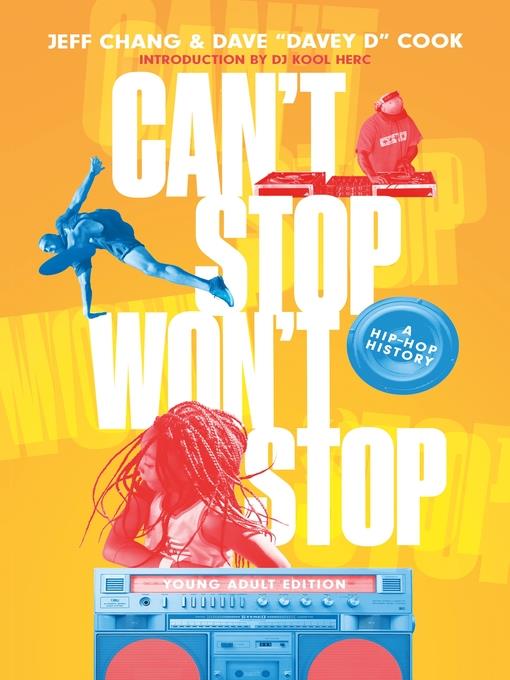
Can't Stop Won't Stop
A History of the Hip-Hop Generation
فرمت کتاب
ebook
تاریخ انتشار
2021
شابک
9781250198556
کتاب های مرتبط
- اطلاعات
- نقد و بررسی
- دیدگاه کاربران
نقد و بررسی

December 15, 2020
Grades 9-12 *Starred Review* This engrossing, engaging account bills itself as a history of hip-hop, but it's so much more. Divided into four chronological sections (1969-1982; 1983-1990; 1991-1997; 1998-2020), chapters review social and political history in light of the myriad individuals and influences that created this vibrant culture. East Coast, West Coast, Black lives, brown lives, gang wars, civil unrest--all are framed within the context of how they influenced, and were influenced by, the evolving hip-hop scene. Companies blacklisted artists and cancelled contracts, album releases were delayed, and songs were censored, all in testimony to the growing power of this gloriously defiant art form that gave voice to previously marginalized populations. This young adult version is an update to the 2005 adult edition, and terms that are generally considered to be offensive have been removed. There are also exhortations for young people to work together for positive change, beginning with DJ Kool Herc's introduction and carrying through to the final chapter, ""Black Lives Matter."" There's new material about the current generation of women rappers and their body-positivity messaging, the #MeToo movement, and the impact of COVID-19 on the hip-hop community. The book ends with age-appropriate discussion questions that will help young readers grasp the tremendous influence hip-hop has had on current society.
COPYRIGHT(2020) Booklist, ALL RIGHTS RESERVED.

February 1, 2021
Gr 8 Up-The 2005 adult edition of Chang's sweeping overview of hip-hop history garnered several accolades, including an American Book Award. Due to its intended audience, this young adult adaptation is shorter than the original work. An author's note at the beginning indicates that some potentially offensive language has been removed. Part music history and part social history, the text is divided into four "loops," which highlight the performers of the spotlighted time period and the historical events that coincided with the music. Hip-hop aficionados will appreciate the first loop, which covers 1969-1982. Chang pays tribute to lesser-known artists who set the foundation for the genre and contemporary performers such as Notorious B.I.G. and LL Cool J. He also devotes equal time to groundbreaking all-female groups, such as Mercedes Ladies. The well-intentioned desire to include information about every possible performer makes the text sometimes difficult to read, with some paragraphs and pages serving as a laundry list of names. Chang establishes a clear link between hip-hop and its role in protesting racial injustice in the past (i.e. the Rodney King beating) and in the context of current events, such as the death of George Floyd. VERDICT This young adult nonfiction title will be enjoyed primarily by avid hip-hop fans who want to understand the origins of the genre.-Anne Jung-Mathews, Plymouth State Univ., NH
Copyright 2021 School Library Journal, LLC Used with permission.

Starred review from February 1, 2021
A 2005 classic charting hip-hop's rise to global prominence--while navigating the entanglements of race, class, politics, and poetics that lie at its heart--gets a long-overdue redux. Two veteran cultural critics bring the history of hip-hop to younger readers in 2021 as the infinite futures of the genre continue to expand. Readers can feel the seeds of Chang's cultural organizing within the storytelling of this tour de force while Cook brings his decades of experience as a pioneering hip-hop journalist to give new color to this edition. They write of hip-hop's birth in the figurative and all-too-literal fires of Kingston, Jamaica, and the South Bronx before becoming the world's most significant youth cultural influence. Hip-hop founding father DJ Kool Herc reminds readers of the dualities of fun and responsibility at its core in the introduction. Chapters comb through the movement's antecedents in the 1960s, traveling from coast to coast, through the South and all around the world. The authors show the oft-underrepresented ways that Black women have shaped hip-hop, and new chapters chart its championing in the 21st century as a lifestyle built around being anti-establishment grappled with commercial success, political influence, and social change during the 2020 summer of Covid and mass protest. In addition to satisfying committed fans, this stellar work could function as a supplementary text within any social studies narration of the post-civil rights-era U.S. Required history for young hip-hop heads--and everyone else. (reader's guide, endnotes, index) (Nonfiction 12-18)
COPYRIGHT(2021) Kirkus Reviews, ALL RIGHTS RESERVED.

























دیدگاه کاربران